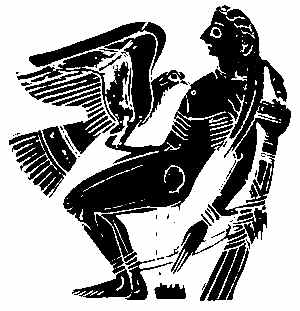|
|||
|
Philatelia.Net / Pirates. Bandits. Adventurers / Plots / The directory «Plots»Prometheus (Προμηθεύς? «forethought»)In Greek mythology, Prometheus is a Titan known for his wily intelligence, who stole fire from Zeus and gave it to mortals for their use. He was then punished for his crime by Zeus. His myth has been treated by a number of ancient sources, in which Prometheus is credited with (or blamed for) playing a pivotal role in the early history of humankind. Prometheus was an ancient Greek Titan. The Prometheus myth first appeared in the Greek epic poet Hesiod's (ca. the late 8th - early 7th centuries BC) Theogony (lines 507-616). He was a son of the Titan Iapetus by Themis or Clymene, one of the Oceanids. As a son of Iapetus he was also a brother of Atlas, Menoetius and Epimetheus. In the Theogony, Hesiod introduces Prometheus as a lowly challenger to Zeus' omniscience and omnipotence. At Sicyon, a sacrificial meal marking the "settling of accounts" between mortals and immortals, Prometheus played a trick against Zeus (545-557). He placed two sacrificial offerings before the Olympian: a selection of bull meat hidden inside an ox's stomach (nourishment hidden inside a displeasing exterior), and the bull's bones wrapped completely in "glistening fat" (something inedible hidden inside a pleasing exterior). Zeus chose the latter, setting a precedent for future sacrifices; henceforth, humans would keep the meat for themselves and burn the bones wrapped in fat as an offering to the gods. This angered Zeus, who hid fire from humans in retribution. Prometheus at once went to Athena with a plea for admittance to Olympus, and this she granted. On his arrival, he lighted a torch at the fiery chariot of the Sun which presently broke from it a fragment of glowing charcoal, which he thrust into the pithy hollow of a giant fennel-stalk. Then, extinguishing his torch, he stole away, and gave fire to mankind. This further enraged Zeus, who sent Epimetheus, brother of Prometheus, Pandora, the first woman, fashioned by Hephaestus out of clay and brought to life by the four winds, with all the goddesses of Olympus assembled to adorn her. "From her is the race of women and female kind," Hesiod writes; "of her is the deadly race and tribe of women who live amongst mortal men to their great trouble, no helpmeets in hateful poverty, but only in wealth." Prometheus, in eternal punishment, is chained to a rock in the Caucasus, where his liver is eaten daily by an eagle (some say a vulture), only to be regenerated, due to his immortality, by night . Years later the Greek hero Heracles would shoot the vulture (or eagle) and free Prometheus from his chains. Hesiod revisits the story of Prometheus in the Works and Days (lines 42-105). Here, the poet expands upon Zeus' reaction to the theft of fire. Not only does Zeus withhold fire from men, but "the means of life," as well (42). Had Prometheus not provoked Zeus' wrath (44-47), "you would easily do work enough in a day to supply you for a full year even without working; soon would you put away your rudder over the smoke, and the fields worked by ox and sturdy mule would run to waste." Hesiod also expands upon the Theogony's story of the first woman, now explicitly called Pandora. After Prometheus' theft of fire, Zeus sent Pandora to Prometheus' brother Epimetheus. Pandora carried a jar with her, from which she released (91-92) "evils, harsh pain and troublesome diseases which give men death." Prometheus is the one who fashions man from inert clay only to find his brother has used up the positive traits. Angelo Casanova finds in Prometheus a reflection of an ancient, pre-Hesiodic trickster-figure, who served to account for the mixture of good and bad in human life, and whose fashioning of men from clay was an Eastern motif familiar in Enuma Elish; as an opponent of Zeus he was an analogue of the Titans, and like them was punished. As an advocate for humanity he gains semi-divine status at Athens, where the episode in Theogony where he is liberated Casanova interprets as a post-Hesiodic interpolation. On a more humorous note, Aesop claims that the existence of homosexuality stems from Prometheus' getting drunk while creating the first humans. Czech Republic, 2004, Prometheus (Antonin Prochazka) Greece, 1973, Punisment of Atlas and Prometheus Greece, 1997, Prometheus Advertising: |
|||
© 2003-2026 Dmitry Karasyuk. Idea, preparation, drawing up
|

